NORCO, or The Spectacular Disintegration of America
NORCO paints the picture of a decaying near-future American South that is both beautiful and horrifying

There's something beautiful in a meltdown.
You can spend hours watching materials atomize. From shape to cell, there is a tangible curiosity in the perversion of matter and concept. For instance, while the decadent ice cream sitting atop your cone on a summer's day might be beautiful and appealing, it is no less ice cream when it has melted and become discarded upon a hot asphalt corner. The state of the thing, while visually altering substantially, is still the thing for better and for worse.
The Familiar and the Abstract
This is the crux of NORCO, the artistic and familiar nightmare crafted by Geography of Robots and Jesse Jacobi (as well as a smattering of other intensely talented individuals). Noir to its very core, NORCO is a game that examines faulty Americana through the lens of an American South that is a slipshod smorgasbord of weird geographies, empathetic conspiracies, disconcerting folklore and on-the-nose environmental travesties. It is a human game, one that elevates the medium entirely by placing the familiar inside of the unknown and stitching the meat flaps together with prose of inarguable quality. It is the game of our times.
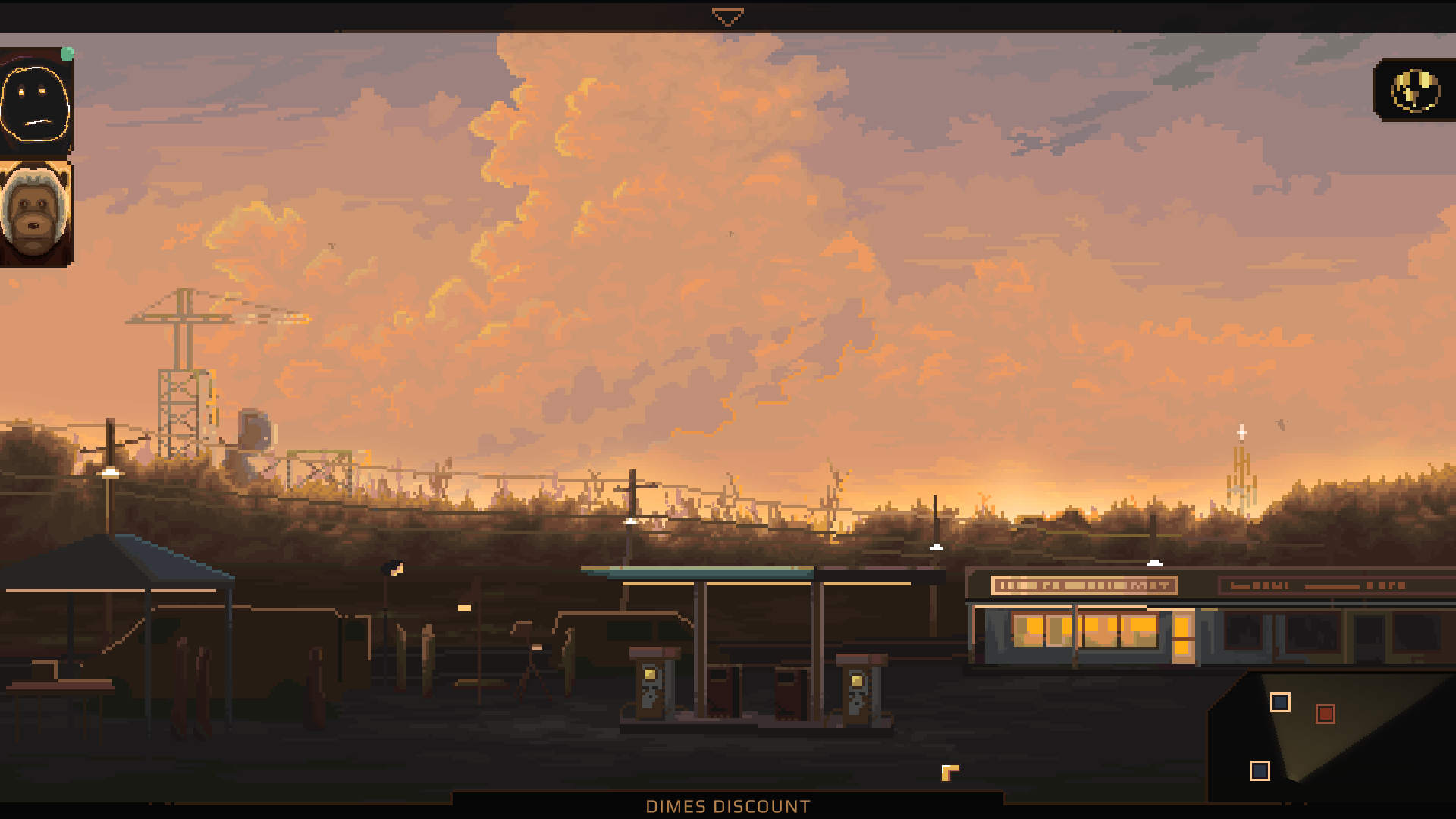
Taking place in the swamps of a near-future Southern Louisiana that are simultaneously metaphorical, biological, and industrial, NORCO cements itself immediately as a game that could be a memory for any one of us, a future thing whose teeth have stepped out of time to leave forever scars. It is as verdant as it is mechanical, as emotional as it is frigid. NORCO is a game about family and functionality, about how far a person might go to see a mystery through to the end.
While NORCO is evocative of so many pieces of art at once, it's tough to nail down the exact inspirations or to mitigate the experience with any simple comparison. A first playthrough might tickle the imagination with everything from True Detective to Fargo to Kentucky Route Zero, with a prose style and subject matter that summons Cormac McCarthy, Stephen King, and Blake Butler. NORCO feels like a movie that you can't quite remember and yet sits on the tip of your tongue, the entire adventure wrapped up in the chimerical cocoon of an entity indecisive of its becoming as a dream or a nightmare. It's the perfect weekend game, an experience so swift and yet still reluctant to let you go.
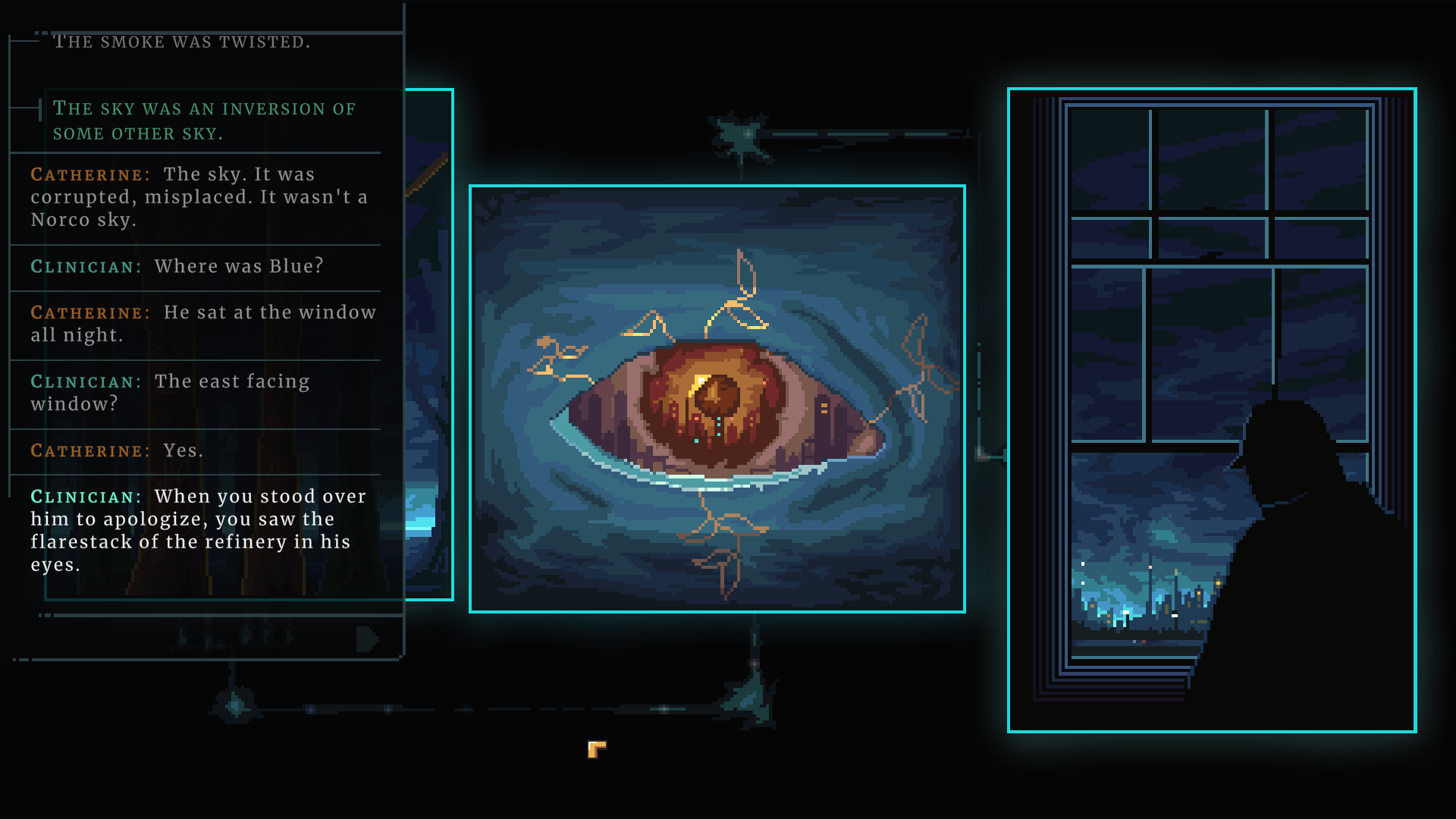
A Journey Through The Mire
Established as a point-and-click adventure game of yesteryear with indescribably gorgeous sprite work, NORCO is the sort of indie title that aggressively drags the medium forward by existing outside of audience expectations. It's difficult to pin down NORCO as anything but a "must play," the type of experience that churned my writer's heart to the same degree as Disco Elysium or 13 Sentinels. The gameplay itself is simplistic and explorative and never gets in the way of the prose, pixels, or presentation. It is, strangely, a cozy title that is also an expertly-paced ride from beginning to end.
In NORCO, you play as Kay (and at times, her mother Catherine) and stomp across the familiar and stomach-churning backyard of your hometown. Kay's brother is missing, and she has returned to Norco, Louisiana in order to find him and gain some familial closure for good. Norco is the terminal endpoint of the American standard, a gangland of openly extreme religious groups, rampant and violent gentrification, unquenchable industrialization, and unending class war.
This techno-noir setting takes place in an unidentifiable point of history, but could just as easily be tomorrow as ten years down the road. The problems that plague the landscape in Norco are the problems we currently face, extrapolated to their most obvious and intense endpoints. Like Kentucky Route Zero, NORCO has much to say about the state of the American experiment, and it says it with its whole chest.
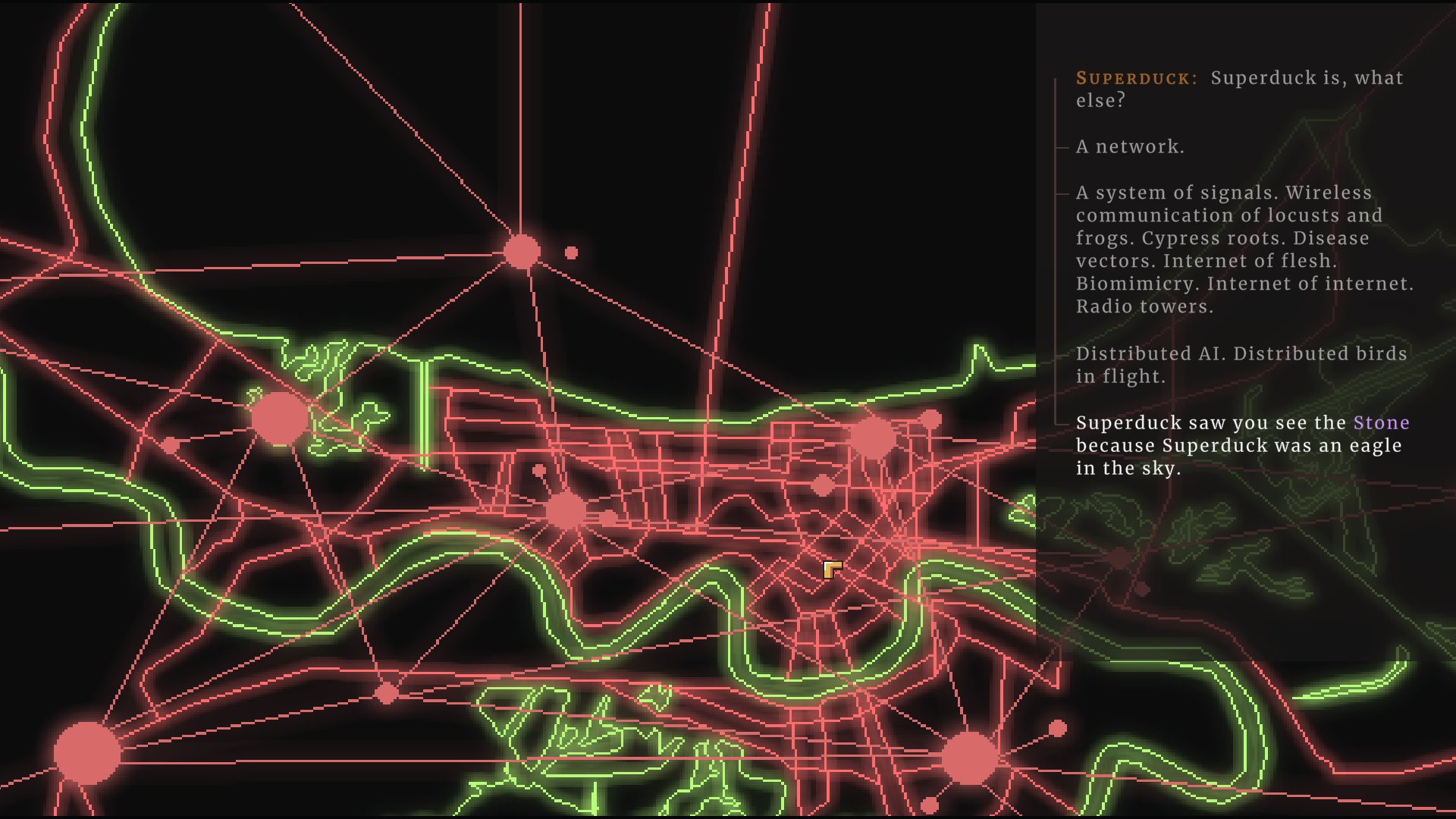
Kay's search for her brother drags her into contact with a lively band of characters that serve or hinder her, from the family robot Million to P.I. LeBlanc to the inscrutable Lucky. Many of the characters that both Kay and Catherine encounter span the story by decades, ineffable entities such as the Superduck or the Garretts transcending time and space. While much of the action happens across the dialogue and scenes, there are surprising moments of near-JRPG combat that occasionally had me (again) pining for an RPG that might someday faithfully contain this level of writing and character work but also support addictive combat. This bit of teasing only added to the strangeness of NORCO's bouquet, as well as the depth and complexity of its rotted terroir.
Ultimately, what serves as its plot centers around the Superduck, a corrupted communications network that can influence frogs and roots as easily as it can influence the internet. It's a physical abomination, an eldritch entity whose artificial intelligence has been distributed across the southern landscape and has become something of a neophyte god within a godless reach. The struggle against the Superduck feels as impossible as the tangible network itself—it is a social network that's been allowed to get completely out of control.
An Apocryphal Americana
While the story is straightforward enough (beat by beat), NORCO rests upon its details. The popular style of storytelling these days is a notch above "show, don't tell" and instead is dependent upon the "vibes" that eke off the overall experience. The vibes within this Southern Gothic tale are immaculate and stomach-churning, and while many questions might linger upon the end credits (especially if you fail to get the preferred ending), it only encourages the player to think about the game long after its finale or play again. NORCO is short enough to encourage its treatment as a novella but impactful enough that a single playthrough might grow throughout the brain of its enjoyers like a deific tumor.
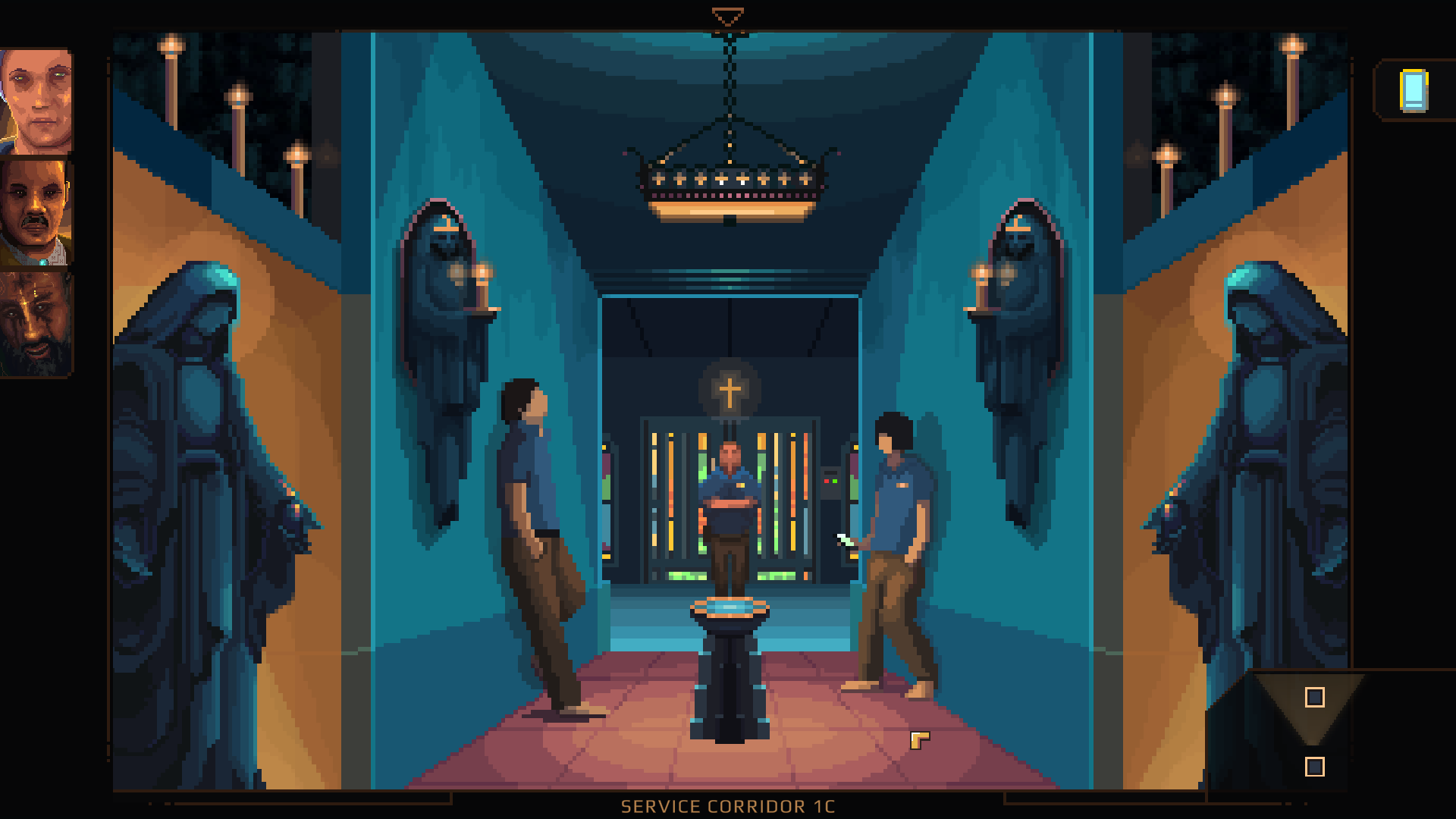
NORCO allows you to keep track of these many details with its interactive "mindmap" that regularly updates and webs together the characters of the game as an overarching lore bible. While Kay's choices seem to impact perception more than circumstance, there's a number of inferences to character motivations that can be pulled from the mindmap itself. I found myself returning to it again and again, desperate to stay on top of the game's eclectic rabble.
My fondness for NORCO's storytelling cocktail was particularly deep—especially when it came to the cult of personality centered around Kenner John and his rabble of skinhead-adjacent Garretts. While doomsday cults of any flavor can be found all across America, there was incredible detail and thought behind this religious furor, smartly placing it at the intersection of typical Christian extremism and Heaven's Gate. This is where the drama of NORCO shines its brightest—nothing in the game, no matter how fantastical, ever felt removed from the American experience.
Kay and Catherine, in their torn and separate ways, are searching desperately for community. Placing us at different points in time, we can see how their orbit unfolds and how the pain of estranged family members can affect the entirety of a city. Whether or not Kay and Catherine's roles in life are as divine as certain characters portend, it's an inarguable truth that their shared places in Norco altered the town forever, in ways that the corrupt and capitalist Shield company could not.
While NORCO certainly contains its share of Elon Musk-level clownish villains, the depth of evil is in a government that could allow such an enormous segment of the country to continually fall into disrepair. Coastal wetlands, swamps, and bayous have been eroding for years, and while 40% of the American wetland exists within Louisiana, "it is estimated that between 25-35 square miles of wetlands are lost each year and more than 1,000,000 acres have been lost since the turn of the century." NORCO is about disappearance—not just the vanishing act of person and community, but the literal erosion of America's physical body.
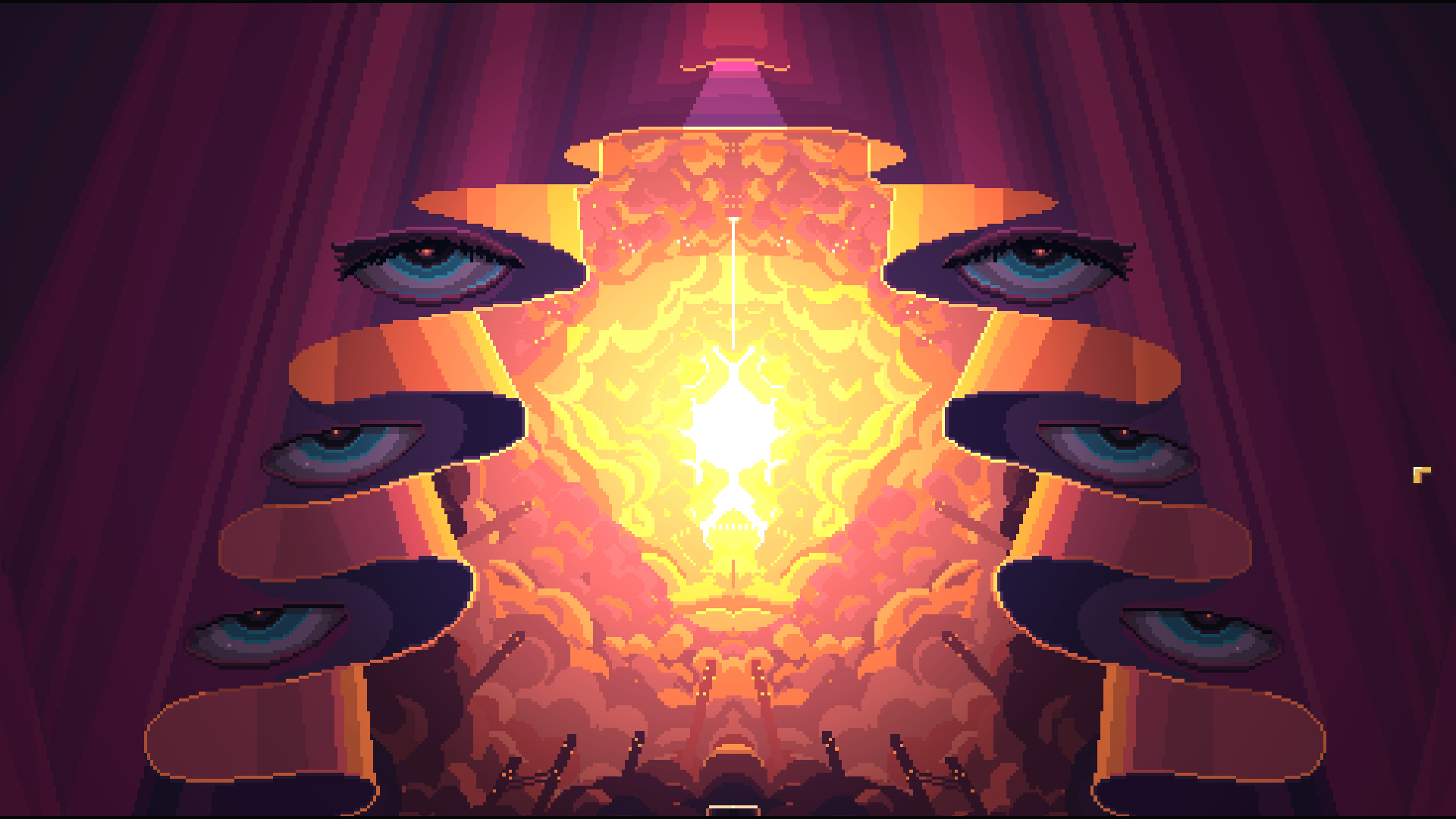
Between Heaven and Hell
The intertwining story of Kay and Catherine, and the many characters between them, certainly feels like an appeal to ridiculous circumstance. These characters are fighting for their home in a variety of personal and complex ways, searching for a means to live while supercompanies farm out the last remaining resources on a dying planet and actively expand toward the stars. The cyberpunk noir nature of NORCO is in its intense believability—citizens drink and party themselves to death, individuals give up on an American dream that stopped existing long before their birth, and communities fight tooth and nail for the most basic of needs. Norco, Louisiana could easily be renamed Anywhere, USA.
That's not to say that Norco isn't a personality and character all its own—the city might be the most important player in the entire drama. While there is very little physical evolution across the lives of Kay and Catherine, the decaying city feels somehow impermeable. This sobering portrayal of a modern dystopia echoes the growing opinion that America is not actually a civilized nation at all, but instead a divided land of meager third-world countries vying for pathetic survival. This is a constellation, a digital force of micro and macrocosmic events, where a bayou-drenched stuffed monkey has the same value as an angelic orb swallowed by a godlike bird. While many video games seek to painstakingly build a believable environment upon the bones of a common understanding, NORCO alienates by placing a mirror firmly before the real.
About halfway through my playthrough of NORCO, I abandoned any semblance of constructing an anchor point with words like "Lynchian" or Gothic. Instead, I became completely mired in the honey-warm weirdness of its core tenants, of a game that felt like it could be a dramatic snapshot of the world my nieces and nephews will live in at my age, a gruesome and lovely portrait whose pixel art becomes more and more real with every passing screen. It's in the characters themselves, the little fucking freaks and weirdos that embody this stage that truly bring to life some meaning for all this travesty and cruelty. This blues endeavor gives us tasting notes of Q-Anon, of Chevron, of Johnson & Johnson and ferments it into a brackish backwater Blade Runner for the disinformation age. The emotional stakes, in the end, are really no more than smiley faces and cellular apps and cronies shitting themselves after eating bad hot dogs.
NORCO is, simply, something to be experienced.
